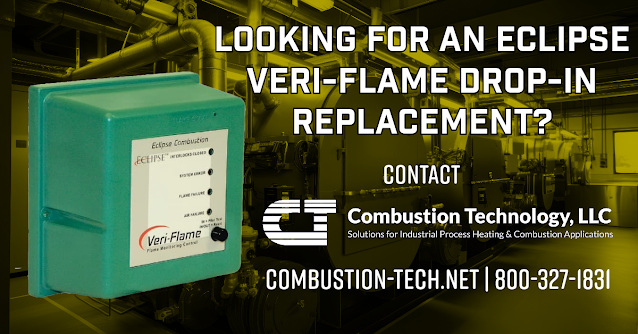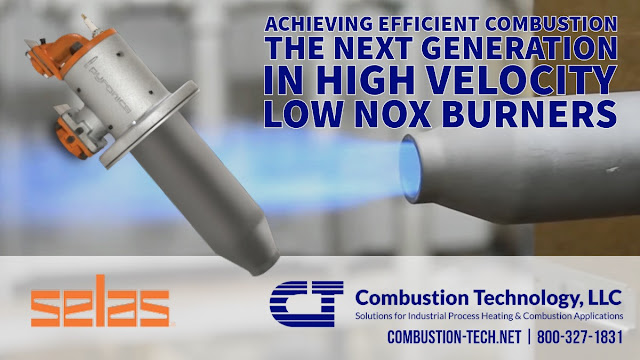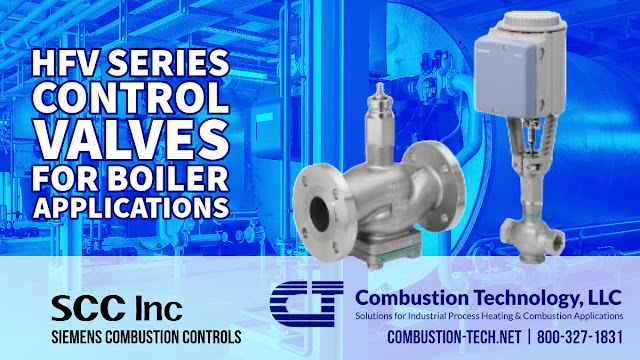This blog will present application solutions and equipment used in process heating. Components such as temperature controls, thermocouples, gas pressure regulators and flow meters, to complete industrial burner systems will be discussed. We hope to educate on current technologies, introduce unique process heating applications, and present new industrial heating/process products. For more, please visit Combustion Technology or call 800-327-1831.
Seeking Alternatives: A Drop-in Replacement in Response to the Discontinuation of Eclipse Veri-Flame
800-327-1831
https://combustion-tech.net
UL508A Control Panels for Modern Process Heating Systems
What is UL508A?
What is a UL508A Control Panel?
How is a UL508A Control Panel Used in Industrial Heating and Combustion Applications?
- Temperature Control: The control panel can regulate the temperature of a furnace, boiler, or oven by adjusting the fuel supply or the operation of heating elements, ensuring that the equipment operates within a safe and desired temperature range.
- Safety Monitoring: The panel can continuously monitor various safety-related parameters. For instance, it can monitor pressure levels inside a boiler or the oxygen level in a combustion chamber. If any of these parameters fall outside of safe limits, the control panel can automatically sound an alarm or even shut down the equipment.
- Sequential Control: In many industrial processes, various stages of the operation must occur in a specific sequence. The control panel can ensure that, for example, a specific valve doesn't open unless a particular temperature is achieved.
- Data Logging: The control panel can record operational data over time, such as temperature profiles, fuel consumption, or emission levels. This data can be crucial for troubleshooting, performance analysis, or compliance with regulatory requirements.
- Interfacing with Other Systems: UL508A control panels can communicate with other systems in the facility, such as building management systems or emergency shutdown systems, ensuring that the heating or combustion system operates harmoniously with the broader environment.
- User Interface: Modern control panels often come with intuitive interfaces that allow operators to set parameters, view current operational data, or respond to alarms. These interfaces can be physical (like buttons or touchscreens) or digital (accessible via a computer or mobile device).
800-327-1831
https://combustion-tech.net
Revolutionizing Industrial Heating: The Selas Superflame™ High Velocity Low NOx Burner
A high velocity burner is an industrial combustion device that produces a high-velocity flame. This type of burner is particularly beneficial in applications requiring higher heat transfer rates or where the flame needs to penetrate deeply into the process media. The high velocity ensures better mixing of the fuel and air, leading to efficient combustion and uniform heating.
Some key features of high velocity burners include:
- Improved Heat Transfer: Due to the high velocity of the flame, there is an increased heat transfer rate from the flame to the material, leading to quicker heating cycles and improved process efficiency.
- Penetration: The forceful nature of the flame allows it to penetrate deeply into materials or cavities, ensuring uniform heating, which is particularly useful in processes like forging or certain types of melting applications.
- Reduced Scale Formation: In metal heating processes, the formation of scale (an oxide layer) on the metal surface is a concern. The high-velocity flame can reduce the formation of this scale, leading to better product quality.
- Efficient Combustion: The combustion process in a high-velocity burner is often more complete due to better mixing of fuel and air, meaning fewer unburned hydrocarbons and lower emissions.
Selas, headquartered in Streetboro, Ohio, manufactures industrial burners and serves the industrial thermal processing industry by offering various innovative and reliable gas burners, combustion systems, and thermal components. Their new product, the Superflame™ Low NOx Medium & High Velocity Burner, is constructed with an outer tube from advanced silicon carbide. The inner firing tube consists of stainless steel alloy. The high-velocity burner uses two-stage combustion to achieve low NOx emissions. Specifically designed nozzles facilitate excellent NOx-inhibiting combustion in the first stage. The second stage sees combustion products exiting at speeds exceeding 275fps (83mps) for medium velocity and 400fps (122mps) for high velocity.
The Superflame™generates heat in dense loads and circulates it within the furnace, ensuring faster and more consistent heating. Superflame's medium and high-velocity burners operate effectively with either ambient or preheated combustion air, reaching temperatures up to 700°F (371°C). They also feature durable, lightweight, and self-supporting SiC firing tubes. These burners fit perfectly in brick and fiber wall furnaces and attach easily to the furnace, are compatible with ultraviolet detectors, and most models also accommodate a flame rod. The inclusion of a direct spark offers more flexibility in control system design.
For more information about the Superflame™in the Pacific Northwest, contact Combustion Technology, LLC. Call them at 800-327-1831 or visit https://combustion-tech.net.
The Perfect Fit: Siemens Combustion Controls HFV Series Control Valves for Boiler Applications
- Feedwater Flow Control: The feedwater, which is water fed into the boiler for conversion into steam, must be carefully controlled. A modulating control valve regulates feedwater flow into the boiler, which is critical because the amount of feedwater entering the boiler should match the steam demand from the process. If the feedwater supply is too low, the boiler can run dry, causing damage to the boiler tubes and other components. Conversely, the feedwater supply is too high, which can cause overfilling and unnecessary pressure on the boiler.
- Steam Flow Control: The steam generated in the boiler provides various processes like heating, power generation, etc. The modulating control valve regulates the steam flow from the boiler to the process. It adjusts the steam flow rate according to the process requirements, ensuring the process receives the correct amount of steam at the required pressure and temperature.
HFV Series Control Valve Features
- Up to 150 psi differential across the valve when modulating.
- High close-off pressure.
- Stainless steel body, stem, and plug.
- Linear or equal percentage flow characteristic.
- ANSI Class IV shutoff.
- Fail closed.
Serving the Pacific Northwest with Superior Process Heating Products and Services: Combustion Technology
With over 30 years in the industry, Combustion Technology, LLC specializes in providing comprehensive combustion and process heating applications solutions. Our product range includes everything from discrete components like temperature controls, thermocouples, gas pressure regulators, and flow meters to fully integrated industrial burner systems.
Our team of experts stands ready to assist with your most challenging applications. We support the entire lifecycle of your process heating system, recommending optimal products for the best return on investment and offering immediate access to a wide selection of locally-stocked replacement parts.
- When you partner with Combustion Technology, you can expect the following:
- Deep expertise in process heating and combustion
- An emphasis on minimizing the total cost of ownership
- Access to top-tier product lines
- Smart sales support
- Prompt, efficient, and courteous customer service
- Available technical phone support
- On-site troubleshooting and commissioning
As a seasoned supplier-partner in thermal processing systems and burners, our wide range of combustion equipment and expertise in instrumentation, valves, and control systems sets us apart in the industry.
https://combustion-tech.net
800-327-1831
The NORVAL Pressure Regulator by Pietro Fiorentini
- Simple Installation
- 250:1 Turndown: Allows for wider applications
- Constant Outlet Pressure, despite varying inlet pressures
- High Accuracy
- Balanced Valve Design: Provides quick response to varying operating conditions
- Over Pressure Protection: Optional bolt on slam shut
The Crucial Role of Industrial Combustion Experts in Heating Applications
Introduction
Burners and Combustion Systems
Controls and Automation
Valves and Flow Control
Safety Systems and Regulations
Maintenance and Troubleshooting
Conclusion
Short Combustion Burner Lead Times
Medium to Low Pressure Gas Regulators
Gas pressure regulators are essential in medium and low-pressure natural gas combustion systems. They control and maintain a consistent gas pressure, ensuring the safe and efficient operation of the combustion process. In medium and low-pressure natural gas systems, these regulators reduce the high-pressure gas from the main supply lines to a safe and stable pressure suitable for the combustion appliances or equipment.
Here's a detailed explanation of the function of gas pressure regulators in medium and low-pressure natural gas combustion systems:
- Pressure reduction: The primary function of a gas pressure regulator is to reduce the incoming high-pressure gas to a lower, more manageable pressure. The regulator achieves this by employing a spring-loaded diaphragm assembly, responding to the pressure changes in the gas flow. The diaphragm helps open or close the regulator's valve, thereby adjusting the gas flow through the regulator and controlling the outlet pressure.
- Pressure stability: Gas pressure regulators maintain a consistent outlet pressure despite gas supply or demand fluctuations. Pressure stability is crucial for the safe and efficient operation of combustion systems, as unstable pressure can cause incomplete combustion, leading to potentially hazardous situations. The regulator's diaphragm and valve assembly work together to balance the forces exerted by the incoming gas pressure, the spring, and the outlet pressure, ensuring a stable and consistent pressure output.
- Overpressure protection: In the event of a malfunction or failure within the gas supply system, the pressure regulator may encounter abnormally high gas pressure. Most regulators are equipped with built-in overpressure protection mechanisms to prevent damage to downstream equipment or appliances, which may include pressure relief valves or vents that allow excess pressure to escape, thus protecting the downstream equipment.
- Safety shut-off: Some gas pressure regulators feature an integrated safety shut-off mechanism. This feature automatically shuts off the gas flow in case the outlet pressure goes beyond acceptable limits, ensuring the safety of the combustion system and avoiding potential damage or hazards.
- Pressure compensation: In some cases, gas pressure regulators are also responsible for compensating for pressure fluctuations resulting from gas temperature or altitude changes. These regulators can maintain a consistent outlet pressure under varying environmental conditions by incorporating temperature or altitude compensation mechanisms.
In summary, gas pressure regulators play a crucial role in medium and low-pressure natural gas combustion systems by reducing and stabilizing the gas pressure, providing overpressure protection, ensuring safety shut-off, and compensating for pressure fluctuations due to temperature or altitude changes. These functions are vital for the safe and efficient operation of combustion appliances and equipment and the prevention of potential hazards.
PF Cirval Medium to Low Pressure Gas Regulators
PF Cirval medium to low pressure gas regulators are available in two sizes: the Cirval 200 with an 8-inch head and the Cirval 300 with a 12-inch head. Designed by Pietro Fiorentini, the Cirval regulator features a diaphragm and a setting spring that control a balanced valve cartridge. This regulator is used in medium and low-pressure natural gas distribution systems and commercial and industrial applications. It is suitable for use with pre-filtered, non-corrosive gases. In compliance with the European Standard EN 334, the PF Cirval classifies as a fail-open regulator.
Designed according to ANSI B109.4 and CSA 6.18 standards, the Cirval regulator operates in a fail-open mode as specified by EN 334. The leakage class of this regulator is bubble-tight, which is better than Class VIII as per ANSI/FCI 70-3.
For more information, contact:
800-327-1831
What Are Immersion Tube Burners?
800-327-1831
Combustion Efficiency in Large Scale Hemp Drying Applications
- Fuel type and quality: The type and quality of fuel used can have a significant impact on the efficiency of combustion. Using a higher quality fuel can lead to better combustion efficiency, and thus, less fuel consumption.
- Air/Oxygen supply: Adequate air supply is essential for efficient fuel combustion. Insufficient air supply can lead to incomplete combustion, which can lead to decreased efficiency, increased emissions, and even fire hazards.
- Combustion chamber design: The design of the combustion chamber can also play a role in combustion efficiency. A well-designed chamber can help to ensure that the fuel is being burned in the most optimal way possible.
- Temperature control: Proper temperature control can also help to ensure efficient fuel combustion. Burning the fuel at too low a temperature can lead to incomplete combustion, while burning it at too high a temperature can lead to increased emissions.
- Wide turndown burners with precise temperature control.
- Modulating gas control valves with .1 of a degree positioning accuracy.
- Process controllers and indicators are accurate to .25% of span.
- 508A listed electrical panels, NFPA 86 compliant
- Secure digital recording of temperature and other critical variables for contract drying.










